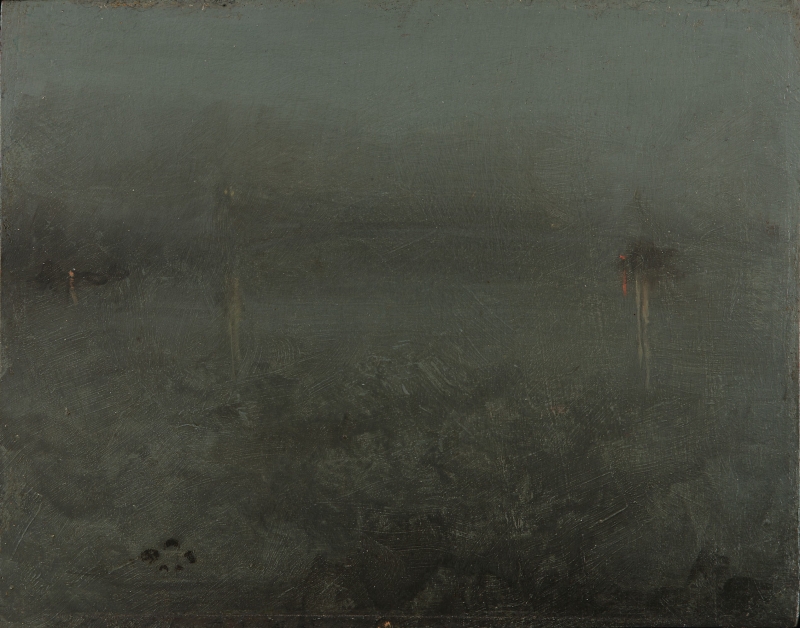Provenance
- 1885: bought from Messrs Dowdeswell by Henry Studdy Theobald (1847-1934) ;
- 1902: bought from Theobald by Charles Lang Freer (1856-1919) , Detroit;
- 1919: bequeathed by C. L. Freer to the Freer Gallery of Art.
It was exhibited in Whistler's one-man show 'Notes' - 'Harmonies' - 'Nocturnes', Messrs Dowdeswell, London, 1884 and bought in the following year by H. S. Theobald, who was almost certainly the collector described by Whistler as having bought a number of paintings after the exhibition. He wrote to Walter Dowdeswell (1858-1929):
'I must know the whereabouts of every one of my little pictures -
You promised that you would give me the address of each one by referring to the catalogues -
Then again, you must arrange with the man who bought the lot that remained over after the exhibition of the "Flesh color & grey", to let his collection go with me to America.' 1
In June 1902, Whistler sent C. L. Freer a telegram, 'Theobald paintings at Marchants', informing him that the paintings owned by Theobald were apparently for sale. 2 Freer promptly bought the painting from Theobald in August 1902 for $1000.
Exhibitions
- 1884: 'Notes' - 'Harmonies' - 'Nocturnes', Messrs Dowdeswell, London, 1884 (cat. no. 25) as 'Nocturne; Silver and Opal – Chelsea'.
- 1887: Exposition Internationale de Peinture et de Sculpture, Galerie Georges Petit, Paris, 1887, 1887 (cat. no. 165) as 'Nocturne en opale: Chelsea'.
- 1892: Nocturnes, Marines & Chevalet Pieces, Goupil Gallery, London, 1892 (cat. no. 11) as 'Nocturne – Opal and Silver'.
- 1904: Oil Paintings, Water Colors, Pastels and Drawings: Memorial Exhibition of the Works of Mr. J. McNeill Whistler, Copley Society, Boston, 1904 (cat. no. 68).
- 1905: Œuvres de James McNeill Whistler, Palais de l'Ecole des Beaux-Arts, Paris, 1905 (cat. no. 75).
The Liverpool Mercury described it on 3 July 1884 as: 'an evening effect of Chelsea ... which shows the painter's penchant for vague indistinctness. The study represents mist or smoke, with a dark line which may be meant for Chelsea or any other bridge.' In contrast, Walter Richard Sickert (1860-1942) wrote simply, 'Mr Whistler has never painted a finer work … There is not an artist with as true or fine a sense of the mystery and infinity of night as Mr Whistler, and this little picture, full of space and atmosphere, is impressive in its solemnity.' 3
Whistler selected one of his favourite unfavourable reviews to complement this nocturne in the Goupil 1892 catalogue. It was a decade-old review of the Grosvenor Gallery exhibition of 1882, and read 'With what feelings must we regard the mad new style, the Nocturnes in "Blue and Silver," the Harmonies in Flesh-colour and Pink, the Notes in Blue and Opal.' 4
In 1892 the critic of The Star called it: 'perfect ... the suspension bridge seems to grow on you and then to fade away just as in the foggy twilight, when the lamps are being lit, it really does.' 5
By the terms of C. L. Freer's bequest to the Freer Gallery of Art, the painting cannot be lent.
Notes:
1: Whistler to W. Dowdeswell, [27 September 1885], GUW #08616. See also H. S. Theobald, receipt, 1 July 1885, GUW #00858; Dowdeswell's account, [July 1885/1886], GUW #00867.
3: '‘An Enthusiast’, [Sickert, W. R.], 'Mr Whistler and His Art', The Artist, vol. 5, 1 June 1884, p. 199-201; press cutting in GUL Whistler PC7, p. 11.
4: Anon., 'The Grosvenor Gallery', Knowledge: An Illustrated Magazine of Science …', no. 32, 9 June 1882, pp. 17-18. See Getscher 1986 [more] , p. 191, J. 101.
5: Anon., The Star, London, 19 March 1892; Whistler's press cuttings are in GUL Whistler PC 7, p. 13; PC 13, p. 15.
Last updated: 6th February 2021 by Margaret





